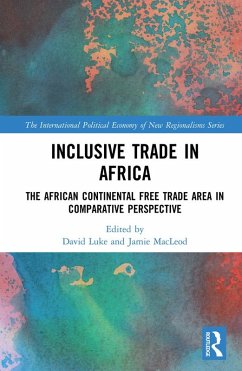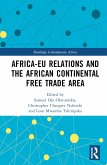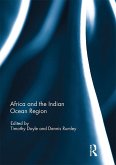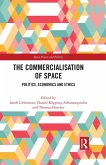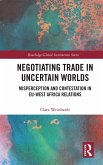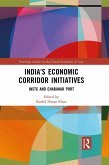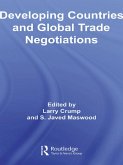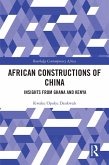Inclusive Trade in Africa (eBook, ePUB)
The African Continental Free Trade Area in Comparative Perspective
Redaktion: Luke, David; Macleod, Jamie
42,95 €
42,95 €
inkl. MwSt.
Sofort per Download lieferbar

21 °P sammeln
42,95 €
Als Download kaufen

42,95 €
inkl. MwSt.
Sofort per Download lieferbar

21 °P sammeln
Jetzt verschenken
Alle Infos zum eBook verschenken
42,95 €
inkl. MwSt.
Sofort per Download lieferbar
Alle Infos zum eBook verschenken

21 °P sammeln
Inclusive Trade in Africa (eBook, ePUB)
The African Continental Free Trade Area in Comparative Perspective
Redaktion: Luke, David; Macleod, Jamie
- Format: ePub
- Merkliste
- Auf die Merkliste
- Bewerten Bewerten
- Teilen
- Produkt teilen
- Produkterinnerung
- Produkterinnerung

Bitte loggen Sie sich zunächst in Ihr Kundenkonto ein oder registrieren Sie sich bei
bücher.de, um das eBook-Abo tolino select nutzen zu können.
Hier können Sie sich einloggen
Hier können Sie sich einloggen
Sie sind bereits eingeloggt. Klicken Sie auf 2. tolino select Abo, um fortzufahren.

Bitte loggen Sie sich zunächst in Ihr Kundenkonto ein oder registrieren Sie sich bei bücher.de, um das eBook-Abo tolino select nutzen zu können.
Providing the first book-length analysis of the African Continental Free Trade Area (AfCFTA), this volume asks how can it be ensured that the AfCFTA is effectively implemented to deliver inclusive trade in Africa.
- Geräte: eReader
- mit Kopierschutz
- eBook Hilfe
- Größe: 4.61MB
Andere Kunden interessierten sich auch für
![Africa-EU Relations and the African Continental Free Trade Area (eBook, ePUB) Africa-EU Relations and the African Continental Free Trade Area (eBook, ePUB)]() Africa-EU Relations and the African Continental Free Trade Area (eBook, ePUB)42,95 €
Africa-EU Relations and the African Continental Free Trade Area (eBook, ePUB)42,95 €![Africa and the Indian Ocean Region (eBook, ePUB) Africa and the Indian Ocean Region (eBook, ePUB)]() Africa and the Indian Ocean Region (eBook, ePUB)46,95 €
Africa and the Indian Ocean Region (eBook, ePUB)46,95 €![The Commercialisation of Space (eBook, ePUB) The Commercialisation of Space (eBook, ePUB)]() The Commercialisation of Space (eBook, ePUB)42,95 €
The Commercialisation of Space (eBook, ePUB)42,95 €![Negotiating Trade in Uncertain Worlds (eBook, ePUB) Negotiating Trade in Uncertain Worlds (eBook, ePUB)]() Clara WeinhardtNegotiating Trade in Uncertain Worlds (eBook, ePUB)42,95 €
Clara WeinhardtNegotiating Trade in Uncertain Worlds (eBook, ePUB)42,95 €![India's Economic Corridor Initiatives (eBook, ePUB) India's Economic Corridor Initiatives (eBook, ePUB)]() India's Economic Corridor Initiatives (eBook, ePUB)42,95 €
India's Economic Corridor Initiatives (eBook, ePUB)42,95 €![Developing Countries and Global Trade Negotiations (eBook, ePUB) Developing Countries and Global Trade Negotiations (eBook, ePUB)]() Developing Countries and Global Trade Negotiations (eBook, ePUB)46,95 €
Developing Countries and Global Trade Negotiations (eBook, ePUB)46,95 €![African Constructions of China (eBook, ePUB) African Constructions of China (eBook, ePUB)]() Kwaku Opoku DankwahAfrican Constructions of China (eBook, ePUB)42,95 €
Kwaku Opoku DankwahAfrican Constructions of China (eBook, ePUB)42,95 €-
-
-
Providing the first book-length analysis of the African Continental Free Trade Area (AfCFTA), this volume asks how can it be ensured that the AfCFTA is effectively implemented to deliver inclusive trade in Africa.
Dieser Download kann aus rechtlichen Gründen nur mit Rechnungsadresse in A, B, BG, CY, CZ, D, DK, EW, E, FIN, F, GR, HR, H, IRL, I, LT, L, LR, M, NL, PL, P, R, S, SLO, SK ausgeliefert werden.
Produktdetails
- Produktdetails
- Verlag: Taylor & Francis
- Seitenzahl: 226
- Erscheinungstermin: 1. April 2019
- Englisch
- ISBN-13: 9780429684753
- Artikelnr.: 56149769
- Verlag: Taylor & Francis
- Seitenzahl: 226
- Erscheinungstermin: 1. April 2019
- Englisch
- ISBN-13: 9780429684753
- Artikelnr.: 56149769
- Herstellerkennzeichnung Die Herstellerinformationen sind derzeit nicht verfügbar.
David Luke is Coordinator of the African Trade Policy Centre at the United Nations Economic Commission for Africa. He is responsible for leading the UN Economic Commission for Africa's (ECA) research, policy advisory services, training and capacity development on inclusive trade policies and in particular the boosting intra-African trade and the African Continental Free Trade Area initiatives. His portfolio also includes WTO, EPAs, Brexit, AGOA, Africa's trade with emerging economies and trade and cross-cutting policy areas such as trade, industrialization and structural transformation, trade and gender, trade and public health and trade and climate change. Prior to joining ECA in 2014, he served as UNDP trade policy adviser in Southern Africa and Geneva and also as Senior Economist and Chief of Trade at the Organization for African Unity/African Union Commission, and as an Associate Professor at Dalhousie University in Halifax, Canada. He holds a B.Sc. and M.Sc. from the London School of Economics and a Ph.D from the School of Oriental and African Studies, London. Jamie MacLeod is a Trade Policy Expert of the Africa Trade Policy Centre at the United Nations Economic Commission for Africa in Addis Ababa, Ethiopia. He has consulted broadly on trade policy issues, including with the World Bank, the European Commission and the Danish International Development Agency, and was formerly a Trade Economist at the Ghanaian Ministry of Trade and Industry. He holds an M.Sc. in Economics for Development from the University of Oxford, where he was awarded the Snell Scholarship, and an M.A. in Economics from the University of Glasgow.
Foreword, Albert Muchanga; Introduction: bringing about inclusive trade in
Africa with the African Continental Free Trade Area, David Luke and Jamie
MacLeod; Chapter 1: Making the case for the African Continental Free Trade
Area, David Luke; Part I: Lessons learned from regional integration in
Africa and beyond; Chapter 2: The AfCFTA as yet another experiment towards
continental integration: retrospect and prospect, Guillaume Gerout, Jamie
MacLeod and Melaku Desta; Chapter 3: The failure of the Free Trade Area of
the Americas: a cautionary tale for the African Continental Free Trade
Area, Sebastian Herreros; Chapter 4: ASEAN at 50 and beyond, Mia Mikic and
Weiran Shang; Part II: Implementing a "win-win" AfCFTA; Chapter 5: How
important is special and differential treatment for an inclusive AfCFTA?,
Lilly Sommer and Jamie MacLeod; Chapter 6: AfCFTA, value chains and
overlapping origin regimes: a complementarity assessment along a segment of
the copper value chain in Africa, Guillaume Gerout and Harrison Addo-Obiri
; Chapter 7: Governance for an effective AfCFTA, Babajide Sodipo; Chapter
8: The AfCFTA in a changing trade landscape: rise of the emerging market
economies and the persistence of African export dependency, Jamie MacLeod;
Chapter 9: Regional Aid for Trade in Africa: a catalyst for economic
integration and development, Frans Lammersen, Raffaela Muoio and Michael
Roberts; Part III: Preparing for the AfCFTA phase II negotiations; Chapter
10: Approaching competition policy in the AfCFTA, Elizabeth Gachuiri;
Chapter 11: A principled approach to intellectual property rights and
innovation in the African Continental Free Trade Agreement, Caroline Ncube,
Tobias Schonwetter, Jeremy De Beer and Chidi Oguamanam
Africa with the African Continental Free Trade Area, David Luke and Jamie
MacLeod; Chapter 1: Making the case for the African Continental Free Trade
Area, David Luke; Part I: Lessons learned from regional integration in
Africa and beyond; Chapter 2: The AfCFTA as yet another experiment towards
continental integration: retrospect and prospect, Guillaume Gerout, Jamie
MacLeod and Melaku Desta; Chapter 3: The failure of the Free Trade Area of
the Americas: a cautionary tale for the African Continental Free Trade
Area, Sebastian Herreros; Chapter 4: ASEAN at 50 and beyond, Mia Mikic and
Weiran Shang; Part II: Implementing a "win-win" AfCFTA; Chapter 5: How
important is special and differential treatment for an inclusive AfCFTA?,
Lilly Sommer and Jamie MacLeod; Chapter 6: AfCFTA, value chains and
overlapping origin regimes: a complementarity assessment along a segment of
the copper value chain in Africa, Guillaume Gerout and Harrison Addo-Obiri
; Chapter 7: Governance for an effective AfCFTA, Babajide Sodipo; Chapter
8: The AfCFTA in a changing trade landscape: rise of the emerging market
economies and the persistence of African export dependency, Jamie MacLeod;
Chapter 9: Regional Aid for Trade in Africa: a catalyst for economic
integration and development, Frans Lammersen, Raffaela Muoio and Michael
Roberts; Part III: Preparing for the AfCFTA phase II negotiations; Chapter
10: Approaching competition policy in the AfCFTA, Elizabeth Gachuiri;
Chapter 11: A principled approach to intellectual property rights and
innovation in the African Continental Free Trade Agreement, Caroline Ncube,
Tobias Schonwetter, Jeremy De Beer and Chidi Oguamanam
Foreword, Albert Muchanga; Introduction: bringing about inclusive trade in
Africa with the African Continental Free Trade Area, David Luke and Jamie
MacLeod; Chapter 1: Making the case for the African Continental Free Trade
Area, David Luke; Part I: Lessons learned from regional integration in
Africa and beyond; Chapter 2: The AfCFTA as yet another experiment towards
continental integration: retrospect and prospect, Guillaume Gerout, Jamie
MacLeod and Melaku Desta; Chapter 3: The failure of the Free Trade Area of
the Americas: a cautionary tale for the African Continental Free Trade
Area, Sebastian Herreros; Chapter 4: ASEAN at 50 and beyond, Mia Mikic and
Weiran Shang; Part II: Implementing a "win-win" AfCFTA; Chapter 5: How
important is special and differential treatment for an inclusive AfCFTA?,
Lilly Sommer and Jamie MacLeod; Chapter 6: AfCFTA, value chains and
overlapping origin regimes: a complementarity assessment along a segment of
the copper value chain in Africa, Guillaume Gerout and Harrison Addo-Obiri
; Chapter 7: Governance for an effective AfCFTA, Babajide Sodipo; Chapter
8: The AfCFTA in a changing trade landscape: rise of the emerging market
economies and the persistence of African export dependency, Jamie MacLeod;
Chapter 9: Regional Aid for Trade in Africa: a catalyst for economic
integration and development, Frans Lammersen, Raffaela Muoio and Michael
Roberts; Part III: Preparing for the AfCFTA phase II negotiations; Chapter
10: Approaching competition policy in the AfCFTA, Elizabeth Gachuiri;
Chapter 11: A principled approach to intellectual property rights and
innovation in the African Continental Free Trade Agreement, Caroline Ncube,
Tobias Schonwetter, Jeremy De Beer and Chidi Oguamanam
Africa with the African Continental Free Trade Area, David Luke and Jamie
MacLeod; Chapter 1: Making the case for the African Continental Free Trade
Area, David Luke; Part I: Lessons learned from regional integration in
Africa and beyond; Chapter 2: The AfCFTA as yet another experiment towards
continental integration: retrospect and prospect, Guillaume Gerout, Jamie
MacLeod and Melaku Desta; Chapter 3: The failure of the Free Trade Area of
the Americas: a cautionary tale for the African Continental Free Trade
Area, Sebastian Herreros; Chapter 4: ASEAN at 50 and beyond, Mia Mikic and
Weiran Shang; Part II: Implementing a "win-win" AfCFTA; Chapter 5: How
important is special and differential treatment for an inclusive AfCFTA?,
Lilly Sommer and Jamie MacLeod; Chapter 6: AfCFTA, value chains and
overlapping origin regimes: a complementarity assessment along a segment of
the copper value chain in Africa, Guillaume Gerout and Harrison Addo-Obiri
; Chapter 7: Governance for an effective AfCFTA, Babajide Sodipo; Chapter
8: The AfCFTA in a changing trade landscape: rise of the emerging market
economies and the persistence of African export dependency, Jamie MacLeod;
Chapter 9: Regional Aid for Trade in Africa: a catalyst for economic
integration and development, Frans Lammersen, Raffaela Muoio and Michael
Roberts; Part III: Preparing for the AfCFTA phase II negotiations; Chapter
10: Approaching competition policy in the AfCFTA, Elizabeth Gachuiri;
Chapter 11: A principled approach to intellectual property rights and
innovation in the African Continental Free Trade Agreement, Caroline Ncube,
Tobias Schonwetter, Jeremy De Beer and Chidi Oguamanam
